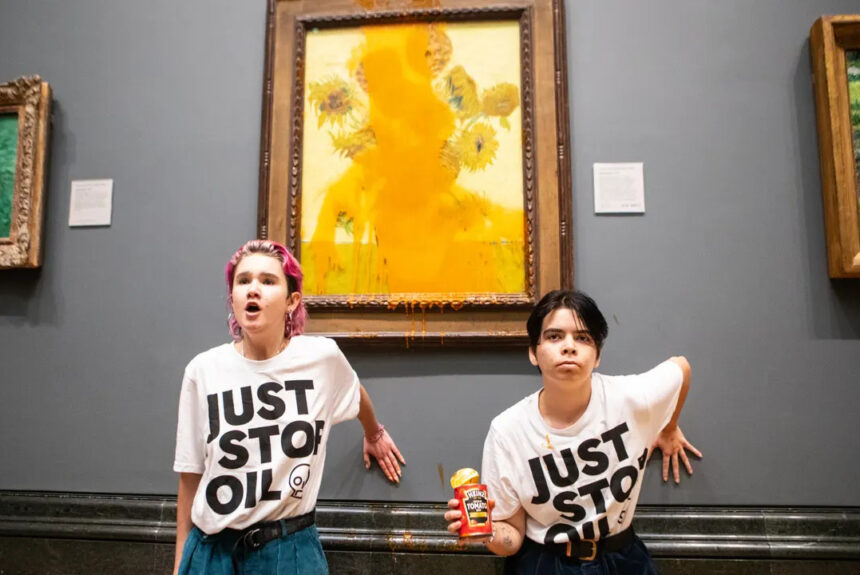British climate activist group Just Stop Oil has made headlines with vandalism. After tossing cans of soup on Van Gough’s Sunflowers at the National Gallery in London two weeks ago, the group recently spray-painted Harrods department store. While Just Stop Oil and groups like it think that they are doing the environment a service, their climate hysteria is setting back meaningful climate progress.
Climate groups like Just Stop Oil and Extinction Rebellion have long employed annoying and harmful tactics to promote their agenda. The groups have halted traffic by gluing themselves to roads, smashed bank windows, and even polluted in the name of fighting climate change. This past spring Just Stop Oil activists began interrupting soccer matches by zip-tying themselves to goalposts. Ironically, all of these tactics have actually supported the oil industry as zip ties, spray paint, and glue are all petroleum derivatives.
>>>READ: Far Left Climate Activists are Emboldening Russia
Irony aside, these strategies are harmful and have real-life consequences. After climate activists stopped traffic on a highway in Maryland this summer, a trucker who was on parole pleaded for one lane to open up so that he could complete a shipment and avoid jail time. More recently, eco-demonstrators in London shut down the Dartford Bridge which resulted in the deaths of two women because backed-up traffic prevented ambulances from arriving on time. While defacing art and causing traffic delays may make headlines, it’s no way to turn the court of public opinion.
The disruption that these groups are promoting is not an effective way to institute lasting solutions. As Bill Gates said on a recent podcast, “I don’t think it’s realistic to say that people are utterly going to change their lifestyle because of concerns about climate.” He then added, “Anyone who says that we will tell people to stop eating meat, or stop wanting to have a nice house, and we’ll just basically change human desires, I think that that’s too difficult.”
Indeed, the degrowth environmentalism that Extinction Rebellion and its cohorts propagate will ultimately run into a collection action problem from society. As a recent poll from C3 Action has found, more than 75 percent of Americans are unwilling to pay $10 more a month for goods and services that produce fewer greenhouse gas emissions. If people aren’t willing to do this, they certainly will not be open to completely change their lifestyles to fight climate change, especially if it’s imposed by the government restricting consumer choice through mandates and regulations.
Furthermore, a degrowth agenda is the wrong way to address the problem. As nations develop and living standards rise, people are going to need and want access to the basic necessities and luxuries of modern living. Solutions rooted in economic freedom can deliver these things in an environmentally sustainable manner. As we have found, free economies are twice as clean as unfree economies.
Strong-arming society to completely change its energy portfolio is dangerous and reckless. Europe is facing an energy crisis that is leading many to prepare for blackouts this winter. And while some are forecasting that peak demand for fossil fuels may be coming sooner than previously anticipated, the Energy Information Administration estimates that overall energy demand will increase 50% by mid-century. Environmental anarchy won’t deliver affordable, reliable and clean energy to consumers. Innovators and entrepreneurs will.
>>>READ: UK Price Caps Prompt Protests Against Energy Bills
Innovation is already beginning to offer solutions to reduce emissions and increase future energy security. Last year NET Power delivered carbon-free natural gas to Texas’ grid for the first time ever. Advanced nuclear company X-energy recently broke ground on the first of its kind advanced fuel facility in Oak Ridge, Tennessee and Frontier, a finance firm created by Stripe, Shopify, Meta, and McKinsey, has committed $925 million through 2030 to accelerate the carbon credit market.
In 2021 global private-sector investment in the energy transition topped a record $920 billion, with $105 billion coming from the U.S. alone. Since 2018, America has spent $420 billion on energy R&D. And while there is still more that can be done, the fact remains that incredible progress is being made to reduce emissions and raise global living standards.
Stopping traffic and preventing people from going to work does the same to reduce emissions as smearing food on priceless art does to solve world hunger. And while climate change is real and should be addressed, the hysteria being promulgated by these activist groups is clouding sound judgment and preventing pragmatic solutions from being implemented. To see meaningful results, groups such as Just Stop Oil should shift their focus from vandalism to advancing innovation and economic freedom.
The views and opinions expressed are those of the author’s and do not necessarily reflect the official policy or position of C3.
